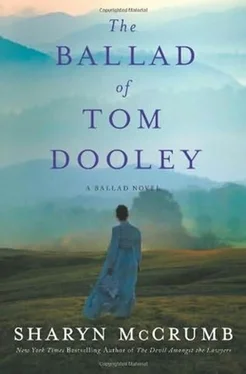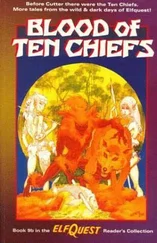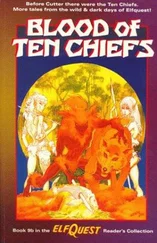Miz Scott just stared at Ann open-mouthed, the way I often see people do when someone screams at them. It seems to freeze them in their tracks, the way deer turn to stone when they hear a noise in the woods. I could see the sense of it for deer, but not for people. When someone shouts at me, I know that they are too het up to think straight, and I find myself looking down on the scene as if I were watching from outside myself, while I try to find a weakness that I can use against them. I was cold and watchful now, but Ann had forgotten me for the moment.
She hustled me out the door, and as we stood on the path, I said, mild as milk, “Do you really think she’ll keep quiet about this?”
Ann’s eyes narrowed, and she glanced back at the still-open door. “Wait here, Pauline, else I’ll thrash you within an inch of your life.”
Without waiting for an answer, she stormed back up the walk to the front door, where Miz Scott stood twisting the tail of her apron, and watching us, to make sure we were leaving. When she saw Ann coming, she took a step back and made to slam the door, but Ann was too quick for her. She blocked it with her body, leaning against the door, and changing her tone to a near whisper, as cold as the March wind. I could still hear her, though.
She said, “Miz Scott, that there Pauline Foster is a liar and a troublemaker. You’d best not be repeating what you heard her say today in your house. For, so help me, if you get me or Tom in trouble by spreading Pauline’s lies, I will follow you to hell to make you wish you’d held your tongue. Do you understand?”
Miz Scott looked at her for a long moment, like she wanted to answer back, but finally she just said, “I hear you. Now get off my land,” and she slammed the door in Ann’s face.
Ann stood there for a moment, still whey-faced with rage, and then she came back and grabbed my elbow again. “Come on, Pauline. We’re going back home, and by god you’ll keep your mouth shut from here on out, or I will kill you myself. You hear me?”
I did. And, what’s more, I believed her.
***
She was right about what I said to Jack Adkins and Ben Ferguson, though. One ought never to jest with a lawman, for they have a grim view of the world. By the end of August, the pair of them had mulled over my remark for a couple of weeks, and no other evidence had turned up to lead them to Laura Foster, so they came to Reedy Branch and arrested me.
I didn’t mind. I don’t get affrighted like other people, and besides, it was only those two prize fools Jack Adkins and Ben Ferguson who came to collect me, and I reckon they were more uneasy about it than I was. Ben Ferguson blushed and stammered as he read out the warrant calling for my arrest, and Jack Adkins said, “Now, Pauline, don’t take on, but we are bound and sworn to bring you in to answer on a charge of murder, but we reckon they’ll let you go once you tell them the truth about what you know.”
“We won’t tie your hands or nothin’,” Ben added. “But you must give us your word you’ll come along peaceable. You can ride up in front of me on my horse, for it’s a long way to Wilkesboro.”
I nodded and gave them my word that I would go along willingly, which I would have promised them regardless, because to my mind saying something is not the same as meaning it. I believe I could have got away from them if I’d had half a mind to. They had sidearms, but I didn’t think either one of them had the sand to shoot an unarmed female. They were both so embarrassed at having to arrest a woman of their acquaintance that they could hardly keep their minds on what they were doing, and they kept telling me that all would be well-as if their word was any good on that point. I nodded and tried to look grateful for their concern, but I thought that going to jail would be a fair bit of adventure, and maybe a chance to do some mischief as well. Anyhow, it would be better than doing all the farm chores and still having to cook three meals a day for the Meltons. Since I was a woman, I’d get a cell to myself, and I could use the rest.
It was a fine afternoon, and we took our time following the river road toward Wilkesboro so as not to overtax Ben’s horse. Horses are dearer than people in Carolina these days, since the Confederate army put them through battles like meat through a sausage grinder. I leaned back and washed my face with sunshine, eyes closed, and smelled the fresh-cut hay as we ambled past the fields and woods on the way to town. I was glad I didn’t have the cast of mind to be a worrier, so that I could enjoy the ride, instead of dwelling on what would happen once I got there.
Wilkesboro is a fair-sized town, sitting on a little rise above the plain, with a line of wooden storefronts facing the town square: a towering red brick courthouse with pitched roofs and a white columned porch atop a flight of white stone steps. Behind the courthouse, just before the town ends in fields again, stood the squat two-story brick jail with barred windows on the right-hand side, both upstairs and down, where the prisoners were kept. I wondered where Tom was.
On the ground floor of the building sat two white painted doors: a small and ordinary looking one on the left side, where the windows weren’t barred, and a wide oak door squarely in the middle of the building. Ben Ferguson swung off the horse and caught its reins. “That there is the jailer’s quarters,” he said pointing left, as if I couldn’t figure that out for myself.
He helped me down out of the saddle, and steered me by the elbow toward that wide center door. I looked back toward the courthouse, the way we had come, and from where I stood I could look straight down the dirt street, past the trees, to a wall of blue mountains hazy in the distance, mingling with the clouds. Watauga County lay that way, and beyond it Tennessee. I wondered if Tom Dula could see the mountains from the window of his cell.
I thought about calling out to him, to see could he hear me, but they hustled me in past that stout oak door, which was banded with iron on the inside, in case anyone tried to help a prisoner break out of jail. We stood in a wide hallway that ran the width of the building, and off to the right a flight of wooden stairs went up to the next floor. Through the open door on the left, I could see the jailer’s parlor, a tidy little room with a rag rug over a plank floor and a dark heavy china cupboard set against the wall by the fireplace. I was hoping that they’d take me in there for questioning, but they started up the stairs, and ushered me in to a whitewashed room at the back of the building, with nothing in it but a cot and a bucket. It was cleaner than the Meltons’ place, but too sparse for comfort. I didn’t plan to stay long.
Jack Adkins turned to leave. “You stay with her, Ben. I’ll go get Sheriff Hix.”
With that, he was gone. I walked over to the window, and peered out through the iron bars, making sure that I could see the mountains on the horizon. Sure enough, they were there, and I thought to myself that if I ever got out of here-and I meant to-then I’d head back to those hills and never come down again.
Ben was fidgeting over by the doorway. “It’s no business of mine what you do, Pauline, but if you want my advice, I think you’d better tell the sheriff everything you know. Ever since Laura Foster disappeared, you’ve been dropping hints right and left, and the word has got around. First you offered to get Wilson Foster’s horse back in exchange for a jug of whiskey. Then you told Ben and me that you and Tom had done the killing. Now, I can’t see any reason for you to have done this murder, if in fact that’s what it was, but I warn you that they will not let you out of here until they are satisfied that you have told them whatever you know.”
Читать дальше












